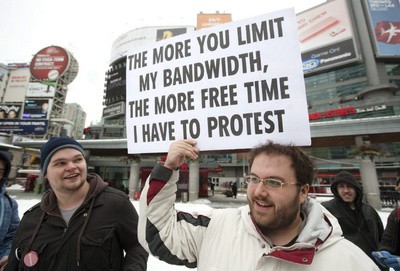Thomas Larsen, group vice president of legal and public affairs for Mediacom told The Gazette the consumption-based billing program was intended to pay for the cost of network upgrades incurred by “individuals who are the highest users.”
But Mediacom’s August 10-Q filings (Mediacom LLC and Mediacom Broadband LLC) with the SEC indicate Mediacom’s revenues are increasing faster than the cable operator’s costs to provide service, as customers upgrade to more costly, faster speed Internet tiers.
 “Revenues from residential services are expected to grow as a result of [broadband] and phone customer growth, with additional contributions from customers taking higher speed tiers and more customers taking our advanced video services,” Mediacom reports. “Based upon the speeds we offer, we believe our High Speed Data (HSD) product is generally superior to DSL offerings in our service areas. As consumers’ bandwidth requirements have dramatically increased in the past few years, a trend we expect to continue, we believe our ability to offer a HSD product today with speeds of up to 105Mbps gives us a competitive advantage compared to the DSL service offered by the local telephone companies. We expect to continue to grow HSD revenues through residential customer growth and more customers taking higher HSD speed tiers. “
“Revenues from residential services are expected to grow as a result of [broadband] and phone customer growth, with additional contributions from customers taking higher speed tiers and more customers taking our advanced video services,” Mediacom reports. “Based upon the speeds we offer, we believe our High Speed Data (HSD) product is generally superior to DSL offerings in our service areas. As consumers’ bandwidth requirements have dramatically increased in the past few years, a trend we expect to continue, we believe our ability to offer a HSD product today with speeds of up to 105Mbps gives us a competitive advantage compared to the DSL service offered by the local telephone companies. We expect to continue to grow HSD revenues through residential customer growth and more customers taking higher HSD speed tiers. “
Mediacom’s consumption billing program, already in effect for new customers, will be imposed on all Mediacom broadband customers starting in September. Larsen claims only about three percent of customers will be impacted by the usage allowance, which will include 250GB of usage for customers selecting the company’s most popular speed tier. Larsen also claimed the average Mediacom customer uses only 14GB per month.
That usage profile is below the national average, and leads to questions about why Mediacom needs a usage allowance system when 97 percent of its customers do not present a burden to the cable company.
“Once a customer reaches their monthly allowance, for $10 they can purchase an additional 50GB a month of capacity,” Larsen explained. “Each time that they reach that next level, they’ll be able to purchase another allotment. We’re never going to stop you from using data, we’re just going to charge you more if you exceed your monthly allowance. Before, we could cap you, there was no mechanism for them to purchase more.”
Mediacom did not frequently enforce its usage caps in the past except in instances where usage levels created problems for other customers. Despite Larsen’s assertion Mediacom would spent the overages collected from heavy users on broadband upgrades, Mediacom’s report to the SEC indicates broadband usage has never been a significant burden for the cable operator:
Our HSD and phone service costs fluctuate depending on the level of investments we make in our cable systems and the resulting operational efficiencies. Our other service costs generally rise as a result of customer growth and inflationary cost increases for personnel, outside vendors and other expenses. Personnel and related support costs may increase as the percentage of expenses that we capitalize declines due to lower levels of new service installations. We anticipate that service costs, with the exception of programming expenses, will remain fairly consistent as a percentage of our revenues.
Although Mediacom reported field operating costs rose 7.6%, much of that increase was a result of greater fiber lease and cable location expenses on its wireless backhaul business for cell towers and greater use of outside contractors. In the company’s latest 10-Q filing, Mediacom reports its revenues increased 2.9 percent in the past year while its costs rose only 1.5 percent. Mediacom’s revenues from its broadband division are even more rosy, rising 9% in the past year alone. In fact, broadband is the company’s highest growth residential business.
Many of Mediacom’s long-standing customers were initially promised they would be exempt from usage caps, with only new customers subject to usage limits. But Mediacom has unilaterally changed their minds, much to the consternation of some customers.

As of this afternoon, Mediacom is still promising customers usage caps only apply to new customers and those making plan changes.
“It is my belief a man’s word is gold and when Mediacom customers have been told for ages they were grandfathered in with no usage data charges unless they changed plans, that is how it is supposed to be,” said D. Gronceski. “I have explicitly turned down service increases in the past to stay on the unlimited usage plan originally offered by Mediacom […] so I get screwed twice, once for bandwidth caps and again because I’m not getting the services I would be getting if I had not refused the automatic increases.”
 Other customers incensed about the new usage limits have called to cancel service only to be threatened with steep early termination fees.
Other customers incensed about the new usage limits have called to cancel service only to be threatened with steep early termination fees.
“Why do I have to pay an early termination fee?” asked AustinPowersISU. “The way of billing for the service is changing and I do not agree to this method of billing. I should be allowed to terminate my service without paying a fee.”
A Mediacom social media team representative offered one suggestion for customers finding themselves quickly over their usage limits: upgrade to faster speed tiers at a higher price. As for complaints about the unilateral introduction of usage caps with overlimit fees, it’s tough luck for customers, on contract or off:
All Internet users will be held to the new terms of service and usage based billing as of Sept. 7, 2013. There is no agreement to sign, no acknowledgement needed. Continuing to utilize Internet services is acceptance of these changes. If for any reason you do not feel that your current service level meets your needs, let us know and we can have a representative contact you with further options.
[…] Per the posted terms of service and acceptable use policy, there has always been an established data consumption threshold (data allowance) to be enforced at Mediacom’s discretion. With this change, we have clarified these methods of enforcement and have expanded the allowance to offer different levels of users different options. We have notified the proper departments of possible additions, but these statements are and have been posted.
[flv width=”640″ height=”380″]http://www.phillipdampier.com/video/KCRG Cedar Rapids Mediacom Going Usage Billing 8-21-13.mp4[/flv].
KCRG in Cedar Rapids reports Mediacom is switching to consumption billing for broadband service in September. (2 minutes)

 Sure enough, Robert Mercer, a DirecTV spokesman, explained the satellite provider pulls a credit report on every potential customer to determine their financial viability. DirecTV doesn’t want deadbeat customers, not after spending close to $900 to install satellite television in the average home.
Sure enough, Robert Mercer, a DirecTV spokesman, explained the satellite provider pulls a credit report on every potential customer to determine their financial viability. DirecTV doesn’t want deadbeat customers, not after spending close to $900 to install satellite television in the average home.

 Subscribe
Subscribe the worst-rated cable operator in the United States, claims it needs usage caps and consumption billing to force heavy users to pay for needed upgrades. But that isn’t what Mediacom’s executives are telling investors and the Securities and Exchange Commission (SEC).
the worst-rated cable operator in the United States, claims it needs usage caps and consumption billing to force heavy users to pay for needed upgrades. But that isn’t what Mediacom’s executives are telling investors and the Securities and Exchange Commission (SEC). “
“
 Other customers incensed about the new usage limits have called to cancel service only to be threatened with steep early termination fees.
Other customers incensed about the new usage limits have called to cancel service only to be threatened with steep early termination fees. AT&T has boosted the maximum available broadband speed for its U-verse Internet offering to 45/6Mbps service in 40 cities across 15 states.
AT&T has boosted the maximum available broadband speed for its U-verse Internet offering to 45/6Mbps service in 40 cities across 15 states.



